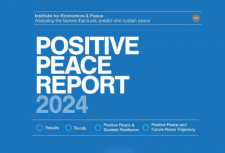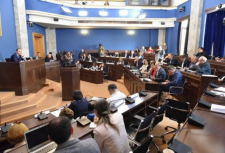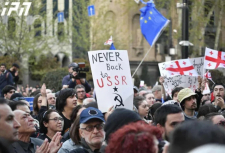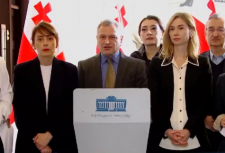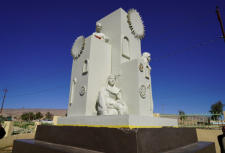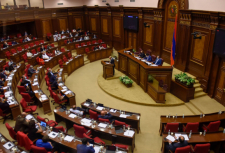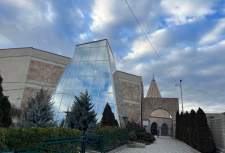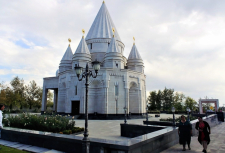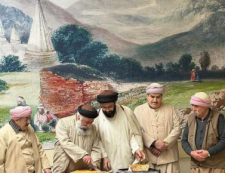Nadia Murad Testifies Before US Senate Human Rights Caucus
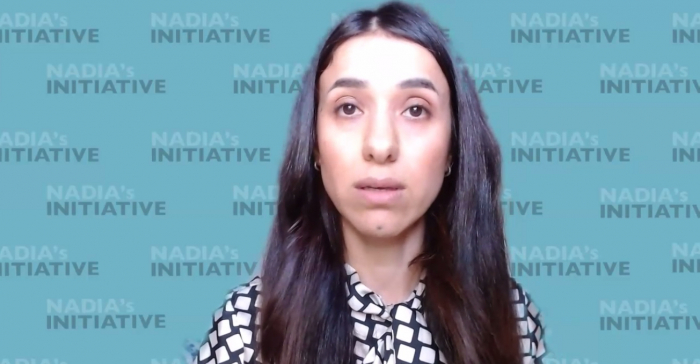
On October 26, 2021, Nadia Murad testified before the US Senate Human Rights Caucus, presided by Senators Chris Coons and Thom Tillis. The event focused on encouraging US policy makers to respond to sexual violence in conflict around the world and create safeguards to prevent the repetition of this atrocity.
Read Nadia’s remarks below:
"Senators Coon and Tillis, thank you very much for inviting me here today. And to the entire Caucus, thank you for providing the opportunity for us to have a meaningful discussion about conflict-related sexual violence. I look forward to a productive conversation and to working with you moving forward.
The history of sexual violence in conflict is as old as conflict itself. It is not possible to examine every aspect of the issue in one hour, but I hope this meeting can be the beginning of an ongoing conversation about how to end sexual violence in war.
Some of you may have heard my story. I am from the Yazidi community, a religious minority in northern Iraq that has been persecuted for centuries because of our faith.
In 2014, ISIS targeted my community in what the United States and United Nations have declared was a genocide. Hundreds of thousands of Yazidis were massacred and displaced at the hands of ISIS. One of their primary tactics was sexual violence. ISIS took more than 6,000 women and children captive. The majority were subjected to sexual slavery, bought and sold like objects.
This atrocity was not inevitable. The Iraqi government and international community had many opportunities to intervene - not only to protect Yazidis from ISIS, but also to reverse the decades-long political, social, and economic marginalization that left my community so vulnerable.
The US had a strong presence in Iraq long before ISIS. But little attention was paid to the situation of women and girls in the country. It is easy to overlook women’s rights when considering issues of national security. But this has grave consequences.
ISIS fully understood the destabilizing effect of gender-based violence, and the terrorist group employed it to their advantage. During their 2014 insurgency, ISIS attacked many communities. But they had a special plan for Yazidis.
This plan hinged on enslaving, selling, and raping women and girls like me. They knew the importance of women for strong societies and that assaulting women’s rights destabilizes communities, stunts economic development, and impedes democracy.
It is a pattern we see around the world—when women are marginalized, societies become destabilized. I’m saddened to say that Yazidis have not been able to rebuild their lives in the seven years since the genocide. No one has supported our recovery as much as ISIS promoted our destruction.
The US, like others, has invested heavily to defeat ISIS, but did not do enough to support the communities who suffered from ISIS’ ideology of terror. Operations like the Coalition to Defeat ISIS should prioritize protection for women and prevention of sexual violence.
Putting these issues to the side has consequences reaching far into the future. Sexual violence does not end when conflict does. There are nearly 2,800 Yazidi women and children who are still held captive throughout Syria, Turkey, and beyond. Their enslavement quickly faded from the headlines and political priorities.
In displacement and post-conflict settings globally, women are exploited because of a lack of security, privacy, and economic stability. I witnessed abuse not only in captivity but also in camps where so many women like me are sent to recover. But survivors cannot heal when the environment of displacement camps directly puts women at risk.
I speak to the Yazidi case because I have seen firsthand how sexual violence has affected my sisters, nieces, and friends. But the issue is not unique to my community. Hundreds of Chibok girls were taken captive by Boko Haram during the same year as the Yazidi Genocide. Many of them are also still missing. In Ethiopia, the Congo, Colombia, Myanmar, and too many other places to name, sexual violence is being employed as a weapon of war as we speak. And, of course, we worry about the safety of women and girls in Afghanistan under Taliban rule.
Protections against sexual violence must be part of all conflict responses. But we must not wait for conflict to break out to act against sexual violence. The US can demonstrate leadership on this issue now by integrating protection from and prevention of sexual violence into its policies regarding international development and security.
Accountability for existing crimes can also be a strong deterrent. US support for tribunals to prosecute ISIS for sexual violence and genocide can jumpstart this process. Holding perpetrators accountable and publicly addressing sexual violence as a war crime can help to end the cycle of violence, while also delivering justice for survivors.
US leadership on human rights is still vitally needed in the world, especially in regions like the Middle East where the US has played such a big role. With meaningful action to prevent and respond to conflict-related sexual violence, the US can protect the rights of women in conflict - and by doing so - make the entire world safer.
Thank you all and I look forward to further discussions."
nadiasinitiative.org
Tags: #yazidisinfo #newsyazidi #aboutyazidi #nadiamurad #nadiasinitiative #humanrightsyazidis
Nadia Murad Testifies Before US Senate Human Rights Caucus

On October 26, 2021, Nadia Murad testified before the US Senate Human Rights Caucus, presided by Senators Chris Coons and Thom Tillis. The event focused on encouraging US policy makers to respond to sexual violence in conflict around the world and create safeguards to prevent the repetition of this atrocity.
Read Nadia’s remarks below:
"Senators Coon and Tillis, thank you very much for inviting me here today. And to the entire Caucus, thank you for providing the opportunity for us to have a meaningful discussion about conflict-related sexual violence. I look forward to a productive conversation and to working with you moving forward.
The history of sexual violence in conflict is as old as conflict itself. It is not possible to examine every aspect of the issue in one hour, but I hope this meeting can be the beginning of an ongoing conversation about how to end sexual violence in war.
Some of you may have heard my story. I am from the Yazidi community, a religious minority in northern Iraq that has been persecuted for centuries because of our faith.
In 2014, ISIS targeted my community in what the United States and United Nations have declared was a genocide. Hundreds of thousands of Yazidis were massacred and displaced at the hands of ISIS. One of their primary tactics was sexual violence. ISIS took more than 6,000 women and children captive. The majority were subjected to sexual slavery, bought and sold like objects.
This atrocity was not inevitable. The Iraqi government and international community had many opportunities to intervene - not only to protect Yazidis from ISIS, but also to reverse the decades-long political, social, and economic marginalization that left my community so vulnerable.
The US had a strong presence in Iraq long before ISIS. But little attention was paid to the situation of women and girls in the country. It is easy to overlook women’s rights when considering issues of national security. But this has grave consequences.
ISIS fully understood the destabilizing effect of gender-based violence, and the terrorist group employed it to their advantage. During their 2014 insurgency, ISIS attacked many communities. But they had a special plan for Yazidis.
This plan hinged on enslaving, selling, and raping women and girls like me. They knew the importance of women for strong societies and that assaulting women’s rights destabilizes communities, stunts economic development, and impedes democracy.
It is a pattern we see around the world—when women are marginalized, societies become destabilized. I’m saddened to say that Yazidis have not been able to rebuild their lives in the seven years since the genocide. No one has supported our recovery as much as ISIS promoted our destruction.
The US, like others, has invested heavily to defeat ISIS, but did not do enough to support the communities who suffered from ISIS’ ideology of terror. Operations like the Coalition to Defeat ISIS should prioritize protection for women and prevention of sexual violence.
Putting these issues to the side has consequences reaching far into the future. Sexual violence does not end when conflict does. There are nearly 2,800 Yazidi women and children who are still held captive throughout Syria, Turkey, and beyond. Their enslavement quickly faded from the headlines and political priorities.
In displacement and post-conflict settings globally, women are exploited because of a lack of security, privacy, and economic stability. I witnessed abuse not only in captivity but also in camps where so many women like me are sent to recover. But survivors cannot heal when the environment of displacement camps directly puts women at risk.
I speak to the Yazidi case because I have seen firsthand how sexual violence has affected my sisters, nieces, and friends. But the issue is not unique to my community. Hundreds of Chibok girls were taken captive by Boko Haram during the same year as the Yazidi Genocide. Many of them are also still missing. In Ethiopia, the Congo, Colombia, Myanmar, and too many other places to name, sexual violence is being employed as a weapon of war as we speak. And, of course, we worry about the safety of women and girls in Afghanistan under Taliban rule.
Protections against sexual violence must be part of all conflict responses. But we must not wait for conflict to break out to act against sexual violence. The US can demonstrate leadership on this issue now by integrating protection from and prevention of sexual violence into its policies regarding international development and security.
Accountability for existing crimes can also be a strong deterrent. US support for tribunals to prosecute ISIS for sexual violence and genocide can jumpstart this process. Holding perpetrators accountable and publicly addressing sexual violence as a war crime can help to end the cycle of violence, while also delivering justice for survivors.
US leadership on human rights is still vitally needed in the world, especially in regions like the Middle East where the US has played such a big role. With meaningful action to prevent and respond to conflict-related sexual violence, the US can protect the rights of women in conflict - and by doing so - make the entire world safer.
Thank you all and I look forward to further discussions."
nadiasinitiative.org
Tags: #yazidisinfo #newsyazidi #aboutyazidi #nadiamurad #nadiasinitiative #humanrightsyazidis
